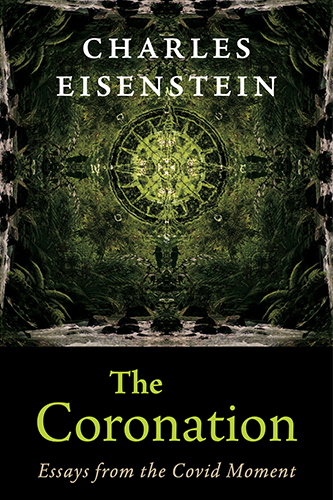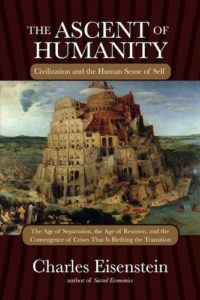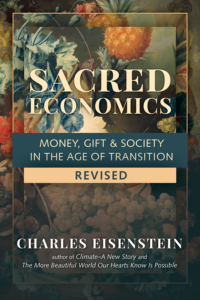The Ascent of Humanity
Chapters
Chapter 2: The Origins of Separation
The Playful Universe
Eternity is in love with the productions of time.
— William Blake
John Zerzan has written, “We have taken a monstrously wrong turn with symbolic culture and division of labor, from a place of enchantment, understanding and wholeness to the absence we find at the heart of the doctrine of progress. Empty and emptying, the logic of domestication with its demand to control everything now shows us the ruin of the civilization that ruins the rest. Assuming the inferiority of nature enables the domination of cultural systems that soon will make the very earth uninhabitable.”[86]
Zerzan’s eloquent lament is correct in every detail except for one: symbolic culture and the division of labor was not a “monstrously wrong turn” but rather, as I have argued throughout this chapter, the direction we have been headed all along. And that would seem even worse! If not a bad choice that is in principle remediable, is this long fall from “enchantment, understanding, and wholeness” just the way of the universe? Are we destined for ruination, desolation, and extinction? Or is this descent a phase of a larger pattern or process?
Back in 1938, the historian Johan Huizinga advanced the concept of “Homo ludens“, the playful human, in direct contradistinction to contemporary anthropology which with near unanimity ascribed early human behavior and development to a struggle for survival. Huizinga suggested that play, not struggle, was the formative element in cultural development, for it was the creative inner world of make-believe through which we rehearsed for the subsequent transformation of the external environment.
He could have broadened the concept of Homo ludens beyond the human realm to include all of life, because play is by no means exclusively human, a fact obvious to anyone who has ever raised a dog or a cat. And it is not just domestic animals that exhibit playfulness but wild ones too—hence the phrase, “monkeying around”. (I refer the reader to Tom Brown Jr.’s captivating accounts of playing with wild animals in his books Tracker and The Search.)
The function of play is quite difficult to explain in Darwinian terms, as it would seem to consume energy that could be directed toward maximizing survival and reproduction. Individuals genetically programmed to play would be at a competitive disadvantage against those who devote their full energy toward food-gathering, mating, and so forth. Thus, when play is addressed at all, we would expect to find rather forced attempts to explain it (or rather explain it away) in terms of mating rituals, dominance, or practice of hunting or other skills. The other alternative, that life is naturally playful, leisurely, and fun, simply does not fit into our basic conceptions of what motivates animal behavior.
In our own culture, play is typically conceived to be the realm of children. The Puritan streak in our culture views it as a luxury, an indulgence, which is okay to allot to children in small amounts as long as they have finished their “work” (schoolwork, homework, housework, etc.) On the more tolerant side of the spectrum, play is okay as long as it is “educational”: hence the numerous toys and games directed at young children which seek to smuggle in the alphabet, numbers, or other “cognitive skills”. To echo the Darwinian explanation of animal play as a means to hone hunting skills, play is good because it is practice for life. Play purely for play’s sake is a waste of time, a view based on the purpose-of-life-is-to-survive assumption that underlies modern science and economics. After all, every minute spent playing is a lost opportunity to get ahead in life.
Either way, eventually we grow up and there is no more time for play. Now, the grim business of real life begins. Oh sure, maybe we can “afford” to play in our “time off”; that is, the time left remaining to us after we have met the demands of survival. But unless we are extremely wealthy, we believe, the bulk of our time and energy must go toward work.
Perhaps the truth is something quite different. Instead of youth being the time for play, maybe it is play that keeps us youthful. Perhaps the boundless free flow of creative expression is what keeps us physically and mentally supple, as a child. When we attempt to control it, limit it, mortgage it to the acceptable and safe, then the bounds of that safety project themselves onto body and mind, subjecting both to a severely limited range of motion that hardens over time.
Let us question the work-play dualism. Consider the possibility that childhood play is practice, yes—but practice for adult play, not adult work! For in fact, the same qualities that characterize childhood play apply equally to the most creative, productive activities of the adult. Childhood play is practice in the exploration of limits, the loosening of inhibitions to creativity, the creative dialogue with the environment, the reimagining of the world presented us. Play is not enslaved to a preset end, but allows the end to emerge spontaneously through the process itself. Play does not require willpower to stay focused and overcome our natural desires; it is natural desire manifest. When we play, we are willing to try things without guarantee of their eventual usefulness or value; yet paradoxically, it is precisely when we let go of such motivations that we produce the things of greatest use. In writing this book, for example, when I steel myself to cover certain material necessary to the book’s logical framework, my words come out pedantic and uninspired; my best writing comes when I’m “playing around” with the ideas, and in this play a logic and structure emerges that is far more potent than anything I could have thought up beforehand. I imagine Thomas Edison doing the same kind of thing, puttering around in his lab, trying this and that with no guarantee of success but in the process thinking of a new idea, trying it out. I imagine Albert Einstein, trying out,, just for his fun and delight, ideas in physics that must have seemed crazy at first, but not caring, exploring them anyway. I don’t mean to compare myself to these geniuses, only to illustrate a principle of creativity: forgetting about what has been done before, what will work, what brings secure results, and trying something else for the fun of it.
Because the creativity of play is spontaneous, unbidden, and impervious to any rote formulization, we must consider that it comes from a source beyond ourselves. We are the universe’s channel for play, an aspect of a universal playfulness expressed through our minds and bodies, employing our mental skills of reason and expression but originating beyond them.
We might then see the hallmarks of our humanity—language, math, art, technology—as originating in play, and indeed being new, highly developed means for the implementation of universal playfulness. The phenomenon of language is a case in point. In the toddler, words are a key element in the development of the imagination and the ability to create a world of make-believe. The same abstracting quality of language that distances us from reality also allows us to create and play with an inner reality, an ability which, honed through a period of mental play, we eventually reapply to the external world, creating novelty with physical things just as we did before with mental word-associated images. Joseph Chilton Pearce speaks of the importance of storytelling to children, who, as they listen with rapt attention, flesh out the stories with sequences of associated images so vivid that it is as if the experience were their own.[87] This capacity, developed in childhood, can then turn to the envisioning in adulthood of what might be. To envision what might be is fundamental both to play (“let’s pretend I’m a bear”) as well as to creativity, which, if authentic, requires the imagining of a possibility that did not exist before. In modern times, when prefabricated images accompany our stories (in the form of storybooks and television) the image-forming capacity never gets a chance to fully develop, and we are rendered incapable of conceiving anything other than the life that is presented us.
I propose, then, that language originated not to coordinate hunting, tool manufacture, or for any other survival purpose, nor, as John Zerzan and the linguist E.H. Sturtevant imply, for purposes of deception. Representational language arose as a form of play, a game of associating sounds to objects and actions. That is why primitive cultures recognized the relative unreality and unimportance of words as compared to sounds, voice, song, and silence; that underneath the conventional and contingent names of people and things lay a mystical True Name that, as I described in discussing the lingua adamica, was not a representation but rather an aspect of the thing in itself. Just as a child at play knows that the rag on a stick is not really a baby, yet makes it so for the purpose of a game, so also did the original users of language playfully abstract words from things for the purpose of creativity—story-telling and make-believe—in precise parallel to the cognitive function of language in a toddler.
This explains the apparent paradox that, even though words are on the one hand symbols, they are also endued with real generative power. As Joseph Epes Brown puts it, “. . . language has creative force. Words are not merely symbols that point to things; they call forth the reality and power of the being mentioned.”[88] Modern thinking understands the symbolic meaning of words to be separate from their base reality as just objects, mere combinations of sound waves or shapes on a page (not so surprising, really, when the things they refer to are equally mere objects of the Cartesian universe). Nonetheless, the knowledge that words are not just representational but creative too can be found in the magical and religious traditions of our own culture. “In the beginning was the Word, and the Word was with God, and the Word was God.”[89] Here in the Bible the word is identified as the wellspring of creativity, the Godhead. Is there, then, a nascent separation implicit in the very existence of a physical universe? Could we see cosmic processes also as a manifestation of play?
Another apparent paradox lies in the sacredness ascribed to language which made profanity impossible in native languages, the reverence and awe attached to the names of people, animals, and places. How is sacredness, reverence, and awe compatible with play? It seems, rather, deadly serious. The paradox is resolved when we realize that play is serious! Our culture assumes play to be puerile or frivolous, undeserving of the attention of serious, adult matters. Yet when we observe children at play we find in them the whole range of human emotions and attachments: laughter, yes, but solemnity too, and passion. Children, at least, take their play very seriously. The forms of recreation that masquerade these days as adult play are but pale imitations of it, sops to the spirit. They are not creative but dissipative; they don’t engage us more fully in life but rather, in the guise of “entertainment”, remove us from life. Whether sports cars, sailboats, or video games, we don’t genuinely believe in our toys.
If we are to relearn from our children how to play, then we must not limit ourselves to the frivolous and puerile. We can, like them, have occasion to play very solemnly, with great dedication and commitment, with laughter or with tears; in short, we can play our way through the full cornucopia of life’s experiences.
If language, technology, and the other elements of separation originated as play, then how did they become something else? In a sense they never did. We are still at play, but immersed neck-deep in a game gone very, very wrong, a game from which we are unable to extricate ourselves. After all, the separation from nature, spirit, self, and other that I write about in this book is not real; it too is a play, a dance of energy and information. Our present loss of all the characteristics of play—spontaneity, fearlessness, spirit of exploration, creativity, willingness to test limits, non-attachment to results—is itself part of a larger game of individuation. In the current age, as the dance of separation becomes increasingly intolerable, as crises mount throughout the world, we are beginning to realize that the time has come to stop playing this game and begin another one. The game of “let’s pretend we are discrete, isolated beings in an objective universe” with all that it entails has served its purpose.
Another way to look at it is that we never stopped playing, but we have forgotten that we are playing. Every once in a while we run into people who are still firmly embedded in modern technological society yet who have cast off its hurried, anxious, alienated mindsets and adopted a more easy-going, playful attitude toward life. Often this happens after a major illness or other personal calamity reveals the vacuity of former ambitions and preoccupations. They say, “I stopped taking life so seriously,” or “I came back to what’s really important.” Yet despite not taking it so seriously, they are not detached from life. They are not passionless or indifferent, but if anything more involved and more fully engaged in the moment, because it is precisely the anxiety of modern life that removes us from the moment, that makes us feel we cannot afford to “be here now” or to fully engage in whatever we are doing.
Another thing these people say is, “I stopped taking myself so seriously,” pointing toward the original source of modern ugliness, suffering, and anxiety in our misconception of self. The forms and structures of our society conspire to instill a false conception of ourselves, to hide from us who we truly are, but we still have the power to disbelieve what we are told and to reclaim our birthright of play. Whereas primitive societies naturally fostered adults secure enough and connected enough to live playfully, our own holds us hostage through subtle, omnipresent threats to our survival. Survival anxiety is what the phrase “cannot afford to” encodes. The sense of being threatened is so subtle and so deeply woven into the fabric of our existence that we are rarely aware of it, like the threat of thunder on a cloudless, humid summer afternoon. It begins in early childhood, when through punishment, shaming, and conditional approval our parents wield the greatest threat of all over our heads, indeed the archetypal threat, which is abandonment by the parent. Eventually we internalize it as an unremitting sense of disquiet that renders us unable to fully concentrate or fully relax (the two are closely related) in the absence of powerful stimuli such as drugs, movies, and other thrills.
Despite my acute awareness of the vast panorama of atrocity and suffering that comprises the history of humanity’s alienation, I do not say that it was all a mistake. As I have argued, the extreme of separation that we have explored in recent centuries was written into the future long, long ago. But more than a neutral inevitability, perhaps the current condition of alienation is necessary for our future development, a possibility I will explore in a later chapter. In any event, it is time for the present game of “let’s pretend” to end. I say this not as an exhortation but as a simple statement of fact. Just as the Age of Separation was inevitable from the inception of agriculture or even before, its ending is equally inevitable. It is inevitable because it is untenable, unsustainable, or, to be more precise, sustainable only at a higher and higher price. Our reunion with the other, in the form of nature, other people, and lost parts of ourselves, will happen when the price of separateness becomes intolerable. I say this as certainly as I can say to an alcoholic, “Your addiction will not last forever.” The addiction generates its own demise. As the gathering crises of the world visit themselves personally upon more and more of us, as it becomes more difficult to insulate ourselves from their effects no matter how wealthy we are, no matter how skillful we are in exercising control over the world, we are collectively “hitting bottom”. The effect on our society will be similar to the effect on the individual of a close brush with death.
When recovering addicts share stories of incredible lost opportunities, torn families, ruined lives, and the destruction left in their wake, their regret is tempered by the knowledge that they have emerged somehow wiser. They tell of a breakthrough to self-forgiveness, which is nothing less than the knowledge that given who they were, they could have done no other than what they did. This parallels the inevitability I speak of. The horrifying course of human history was built into who we were, and through its passage we are becoming something different and greater. Collectively and as individuals, we are being born into a new self. The good news is that this will happen no matter what, as inexorably as a baby is born when gestation is complete. The bad news is that we nonetheless have the power to delay our birthing indefinitely, even to the point where both mother and child must perish. The purpose of my writing is simply to tell everyone not to resist the inevitable! The gig is up. The game is over. It is time to wake up and play something else.
[86] Zerzan, John, “Future Primitive”, http://www.primitivism.com/future-primitive.htm.
[87] Pearce, Joseph Chilton. Evolution’s End. Harper-Collins, 1992. pp. 154-172
[88] Brown, p. 16.
[89] John 1:1






